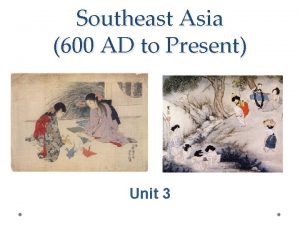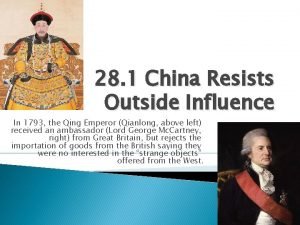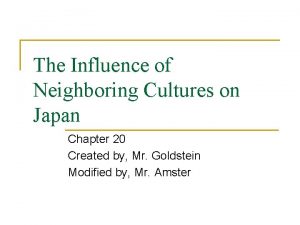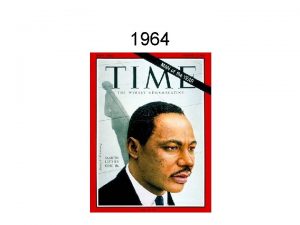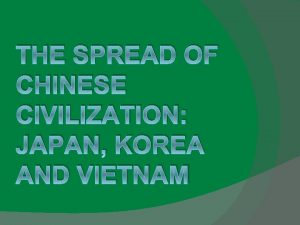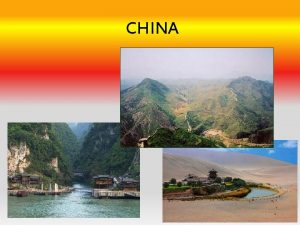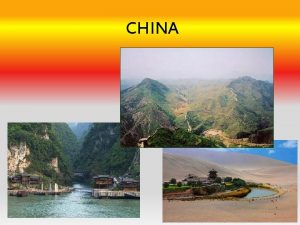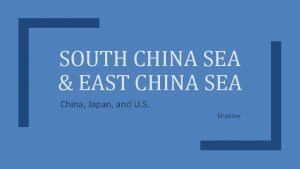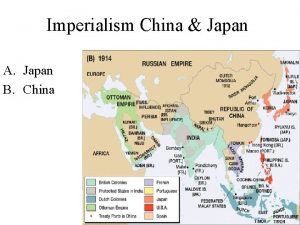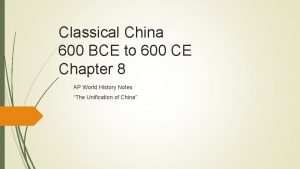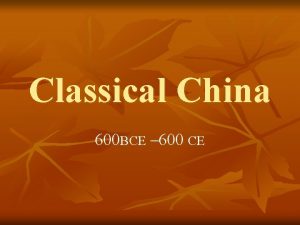Japan Influence from China Starting around 600 Japan









- Slides: 9

Japan!!!!

Influence from China • Starting around 600, Japan begin to adopt many parts of Chinese culture • China was the most powerful region in the world at this time, and developing strong relationships with them made sense for many reasons • Trade • Peace and strong alliances • Confucianism • Buddhism • Chinese written and spoken language • The movement to “China-fy” Japan was called the Taika Reforms

Disagreements with this influence • Buddhist monks became so powerful that they began to take over control of the government in Japan. • Many people did not like this, or other Chinese influence, and fought against these Taika reforms – this was called the Heian Period, around the year 800 • The people of Japan turned away from Chinese influence, and returned to traditional Japanese social and political control • Returned to writing in Japanese • Huge focus on loyalty, beauty, grace, good manners • Importance in fashion, wealth, and little consideration for protection and control of the people or the island • An emperor controlled all of Japan from the capital, and all were to pledge loyalty to him




This perfectly still Spring Day Bathed in the soft light From the spread-out sky, Why do the cherry blossoms so restlessly scatter down? Although I am not sure That he will not be coming In the evening light When the locusts shrilly call I go to the door and wait

Switch to Feudalism • The Capital of the Heian Dynasty, Kyoto, was beautiful and full of wealth, poetry, art, and fashion, but little attention was given to controlling the surrounding areas. • Wealthy families around Japan quickly realized the Japanese emperor had no real power, and was really more of just a figurehead (queen of England). • Around the year 900, these local rulers wanted to gain power, and began to build fortresses and armies to protect their own areas, refusing to pledge loyalty to the emperor, and breaking away from the Heian. • As the power of the capital and its government declined, bandits freely roamed the countryside, and even the streets of the capital, Kyoto. Crime and violence became common in Japan, and commoners began to seek out local rulers to protect them • As the number of these mini-kingdoms grew, widespread violence and war between them became common. This led to the almost complete disappearance of a unified Japan, and began to look like the Feudalism that existed in Europe. • Shift from beauty, fashion, and art to warriors, strength, and war

 Rumus segitig
Rumus segitig Japan 600 ad
Japan 600 ad Chapter 12 section 1 china resists outside influence
Chapter 12 section 1 china resists outside influence In what ways did neighboring cultures influence japan?
In what ways did neighboring cultures influence japan? Example of what goes around comes around
Example of what goes around comes around Martin luther king of hinduism
Martin luther king of hinduism Ano ang ginampanan ni sun yat sen sa nasyonalismo
Ano ang ginampanan ni sun yat sen sa nasyonalismo The age of exploration outcome china and japan's reactions
The age of exploration outcome china and japan's reactions The age of exploration outcome china and japan's reactions
The age of exploration outcome china and japan's reactions Spread of china's literature to heian japan and korea
Spread of china's literature to heian japan and korea

